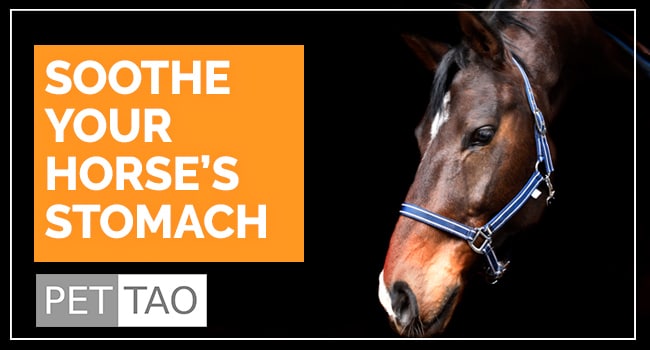What You Need to Know About Horse Ulcers
If your horse all of a sudden loses his appetite and gets fussy about meals, he may be suffering from gastric ulcers.
In fact, gastric ulcers in horses are fairly common.
It is always easier and less expensive to treat horse ulcers if you catch them early.
If you ignore and do not treat gastric ulcers, your horse might colic. And, worst-case scenario, pass away from the colic episode.
Causes of Horse Ulcers
At this point, you may be wondering just how a horse gets ulcers.
Some common causes of horse ulcers are:
- Fasting – Horses are grazers, their bodies designed to frequent small meals. When eating frequently, the stomach is rarely empty. If horses do not eat frequently, acid builds up and ulcers may develop.
- Type of feed – Enough roughage is important. Roughage requires more chewing, stimulating saliva production. Increased saliva neutralizes stomach acid. Also, horses produce more stomach acid when fed concentrates.
- Amount of exercise – As exercise increases, feeding often changes. A horse may fast more or eat less roughage, all increasing ulcer risk. Also, exercise often delays stomach emptying, allowing large amounts of acid in the stomach for prolonged time periods.
- Mediations – Continued use of NSAIDs like Bute or Banamine block the production of the chemical PgE2, which decreases acid production. When PgE2 levels are low, acid levels increase, contributing to ulcer development.
Symptoms of Horse Ulcers
Horses suffering from ulcers display several tell-tale symptoms.
Symptoms of horse stomach ulcers include:
- Attitude changes
- Lying down more than normal
- Mental dullness
- Mild colic
- Appetite loss
- Sparse hair coat
- Poor performance
- Weight loss
As mentioned earlier, equine gastric ulcers can be lethal if left untreated.
Luckily, Eastern medicine offers a natural, herbal remedy for horse stomach ulcers.
Stomach Happy Formula: Western Medicine Applications
Stomach Happy is a Traditional Chinese Veterinary Medicine (TCVM) blend of nine different herbs.
Even though Stomach Happy is a TCVM herbal blend, it still helps symptoms of some Western diagnoses.
Stomach happy helps horses with the following Western diagnoses:
- General gastric ulcers
- Prevention of gastric ulcers
- Stress from training, racing, medicine, or emotion
Stomach Happy Formula: Eastern Medicine Applications
Eastern medicine treats a disease’s root cause(s), rather than symptoms.
Accordingly, TCVM vets use a different evaluation process than Western veterinarians.
TCVM vets look for signs of imbalance.
In fact, ancient Chinese texts show the key to treating gastric ulcers is to nourish the Stomach Yin.
Use Stomach Happy for mild gastric ulcers. (Another formula, Jade Lady, is best for more serious lesions.)
Stomach Happy helps horses with the following TCVM signs:
- Mild to moderate gastric ulcers
- Stress
- Dry mouth
- Excessive thirst
- Poor appetite
- Red tongue
- Thin, fast pulse
- Stomach Yin Deficiency
- Stomach Heat
How Stomach Happy Soothes Horse Ulcers
Stomach Happy is a Traditional Chinese Veterinary Medicine blend of 9 different Eastern herbs.
The herbs perform synergistically, balancing systems and meridians in the body.
Stomach happy addresses the underlying causes of your horse’s illness or disease.
For example, the underlying cause of any disease is an imbalance.
Stomach Happy alleviates your horse’s imbalances and soothes the painful symptoms of illness and disease at the same time.
According to Traditional Chinese Medicine, Stomach Happy heals by:
- Nourishing Yin
- Moving Qi
- Relieving Pain
What Are the Ingredients in Stomach Happy?
- Bai Shao Yao (Paeonia) Nourishes Liver Yin and Blood
- Cang Zhu (Atractylodes) dries up Dampness transforms phlegm
- Chai Hu (Bupleurum) soothes Liver Qi
- Shen Pi (Citrus) moves Qi and relieves pain
- Dang Gui (Angelica) nourishes and activates Blood
- Gan Cao (Glycyrrhiza) harmonizes
- Gua Lou (Trichosanthes) promotes body fluid and transforms phlegm
- Pu Gong Ying (Taraxacum) clears Heat
- Zhi Shi (Aurantium) moves Qi and relieves pain
Stomach Happy’s main ingredients and functions are:
Dr. Huisheng Xie, the founder of the Chi Institute in Reddick, FL, created Stomach Happy specifically for animals.
Dr. Xie created the Stomach Happy formula from information in the Ancient Chinese text “Xiao Yo San with Er Chen Tang.” Er Chen Tang from Tai Ping Hui Min He Ji Ju Fang (Imperial Grace Formulary of the Tai Ping Era) written by Chen Shi-Wen et al in 1080.
Get Stomach Happy at TCVM Pet Supply
Note: Information on our site is provided for educational purposes only and is not meant to substitute the advice provided by your own veterinarian.








